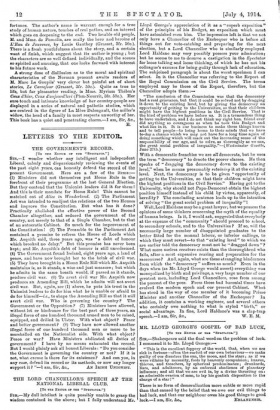T1:114 LORD CHANCELLOR'S SPEECH AT THE NATIONAL LIBERAL CLUB.
[TO THE EDITOR OF 2111I "Brim-rms.:] SIR,—My dull intellect is quite possibly unable to grasp the wisdom contained in the above ; but I folly understand Mr. Lloyd George's appreciation of it as a "superb exposition" of the principles of his Budget, an exposition which must
have astonished even him. The impression left is that we not only have a Chancellor of the Exchequer who is before all
things out for vote-catching and preparing for the next election, but a Lord Chancellor who is similarly employed Lord Haldane may very possibly possess your admiration; but he seems to me to deserve a castigation in the Spectator for loose talking and loose thinking, of which he has not his colleague's excuses for being guilty through lack of education.
The subjoined paragraph is about the worst specimen I can select. In it the Chancellor was referring to the Report of the Royal Commission on the Civil Service. The terms employed may be those of the Report, therefore, but the Chancellor adopts them "The conclusion of the Commission was that the democracy had a real grievance, but that it could be solved not by dragging it down to the existing level, but by giving the democracy an opportunity of getting to the Universities, so that their children might have the highest positions in the Civil Service. That is the kind of problem we have before us. It is a tremendous thing to have undertaken, and I do not think my right hon. friend ever did anything so courageous as when he took this Budget and what lies in it. It is our business to make these things known and to tell people—to bring home to their minds that we have to-day a chance whieh we may not have for a long time again of doing something which will mark out the increasing sense of the, responsibility of our age, and to solve, as thoroughly as we can, the great social problem of inequality."—( Westminster Gazette, June 27th.) With a democratic franchise we are all democrats, but be uses the term " democracy " to denote the poorer classes. He then speaks of "dragging the democracy down to the existing level," when he means presumably retaining it at the existing level. Next, the democracy is to be given "opportunity of getting to the Universities, so that their children might have the highest positions in the Civil Service." Having got to the University, why should not Papa-Democrat obtain the highest position himself instead of his child by virtue, apparently, of heredity ? The concluding sentence leads up to the intention of solving "the great social problem of inequality "I
Well,Lord Haldane maybe a great lawyer; but we possess the opinions of some thinkers concerning the myth of the equality of human beings. Is it, I would ask, suggested that everybody at the expense of the " community " should proceed to school, to secondary schools, and to the Universities ? If so, will the necessarily large number of disappointed graduates be the better fitted for the manual labour, or inferior callings, to which they must revert—to that "existing level" to which we are earlier told the democracy must not be "dragged down "? What more useless creature exists than the thoroughbred who fails, after a most expensive rearing and preparation for the racecourse? And, again, what are these strangling hindrances from which the " democracy " suffers so much ? Even in the days when (as Mr. Lloyd George would assert) everything was monopolized by birth and privilege, a very large number of our greatest men, including Lord Chancellors, rose from among the poorest of the poor. From those bad baronial times have evolved the modern epoch and our present Cabinet. What has stood in the way of one member of it becoming Prime Minister and another Chancellor of the Exchequer ? In addition, it contains a working engineer, and several others who certainly owe nothing to what is styled "birth," or social advantage. In fine, Lord Haldane's was a clap-trap


















































 Previous page
Previous page